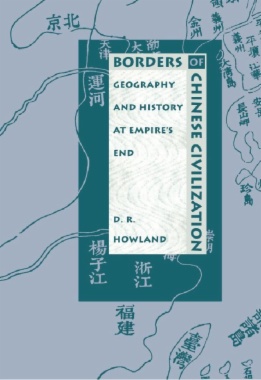D. R. Howland explores China’s representations of Japan in the changing world of the late nineteenth century and, in so doing, examines the cultural and social borders between the two neighbors. Looking at Chinese accounts of Japan written during the 1870s and 1880s, he undertakes an unprecedented analysis of the main genres the Chinese used to portray Japan—the travel diary, poetry, and the geographical treatise. In his discussion of the practice of “brushtalk,” in which Chinese scholars communicated with the Japanese by exchanging ideographs, Howland further shows how the Chinese viewed the communication of their language and its dominant modes—history and poetry—as the textual and cultural basis of a shared civilization between the two societies.
With Japan’s decision in the 1870s to modernize and westernize, China’s relationship with Japan underwent a crucial change—one that resulted in its decisive separation from Chinese civilization and, according to Howland, a destabilization of China’s worldview. His examination of the ways in which Chinese perceptions of Japan altered in the 1880s reveals the crucial choice faced by the Chinese of whether to interact with Japan as “kin,” based on geographical proximity and the existence of common cultural threads, or as a “barbarian,” an alien force molded by European influence.
By probing China’s poetic and expository modes of portraying Japan, Borders of Chinese Civilization exposes the changing world of the nineteenth century and China’s comprehension of it. This broadly appealing work will engage scholars in the fields of Asian studies, Chinese literature, history, and geography, as well as those interested in theoretical reflections on travel or modernism.
- Contents
- Acknowledgments
- Note
- Introduction
- I Encountering Japan
- 1. Civilization from the Center: The Geomoral Context of Tributary Expectations
- Civilization and Proximity
- The Bounds of Diplomatic Protocol
- Japan in the Qing Record
- An Aside: The Aborted Legacy of the Ming
- The Matter of International Treaties
- The Decision to Grant Japan a Treaty (1870)
- Japanese Incident/Dwarf Intrusion (1874)
- 2. Civilization as Universal Practice: The Context of Writing and Poetry
- Brushtalking
- The Written Code: Hanwen/Kanbun
- The Play of the Code
- Tong Wen: Shared Writing/Shared Civilization
- Playing the Code: Occasional Poetry
- Celebrating Tong Wen: Poetry and History
- The Value of Civilization in Japan
- II Representing Japan
- Prologue: Geographical Knowledge and Forms of Representation
- 3. Journeys to the East: The Geography of Historical Sites and Self in the Travelogue
- Images of the East
- Recovering History through Geographical Sites
- Travel Accounts
- 4. The Historiographical Use of Poetry
- The Poems on Divers Japanese Affairs
- The Epistemological Basis of the Poetry-History Homology
- Poetry and Geography
- Evidential Research
- 5. The Utility of Objectification in the Geographic Treatise
- The Decade of Geographic Treatises on Japan
- The Local Treatise as a Model
- Utility as Means and End
- Strategies of Objectification
- III Representing Japan’s Westernization
- 6. Negotiating Civilization and Westernization
- Analogy and Containment
- The Precedence of Learning before Action
- Western Learning and Western Ways
- Alternative Approaches to World Order
- Afterword
- Notes
- Bibliography
- Glossary
- Index

